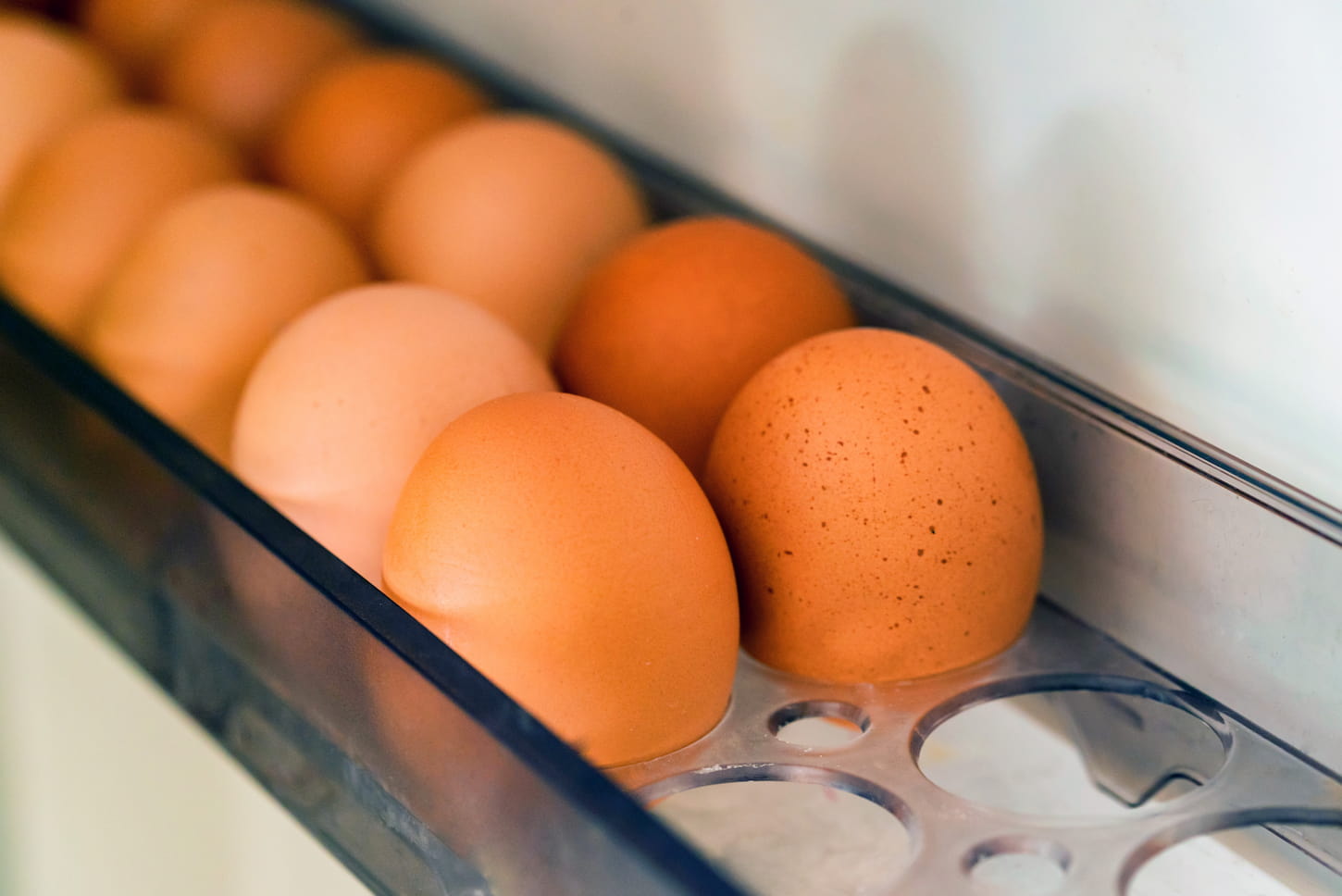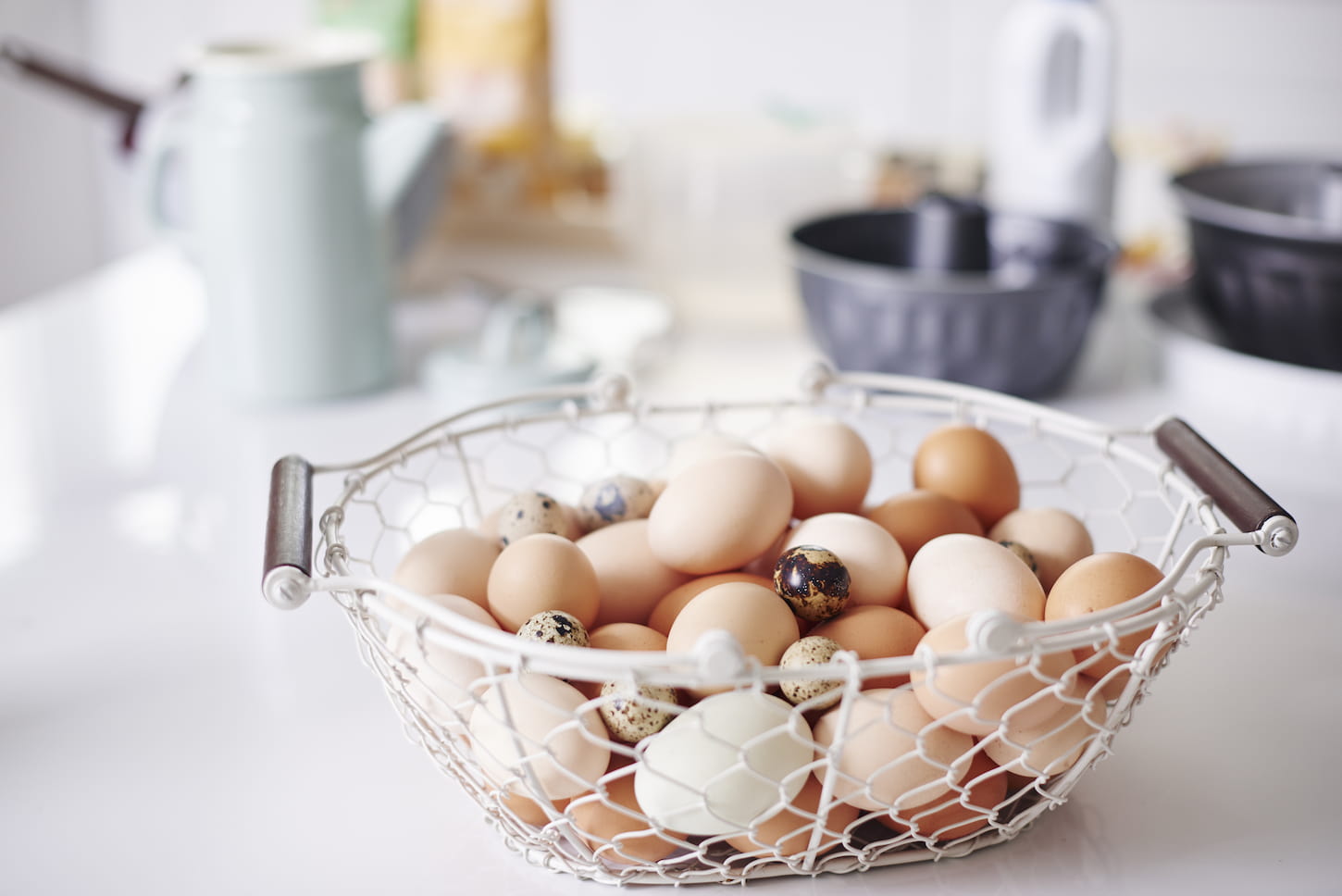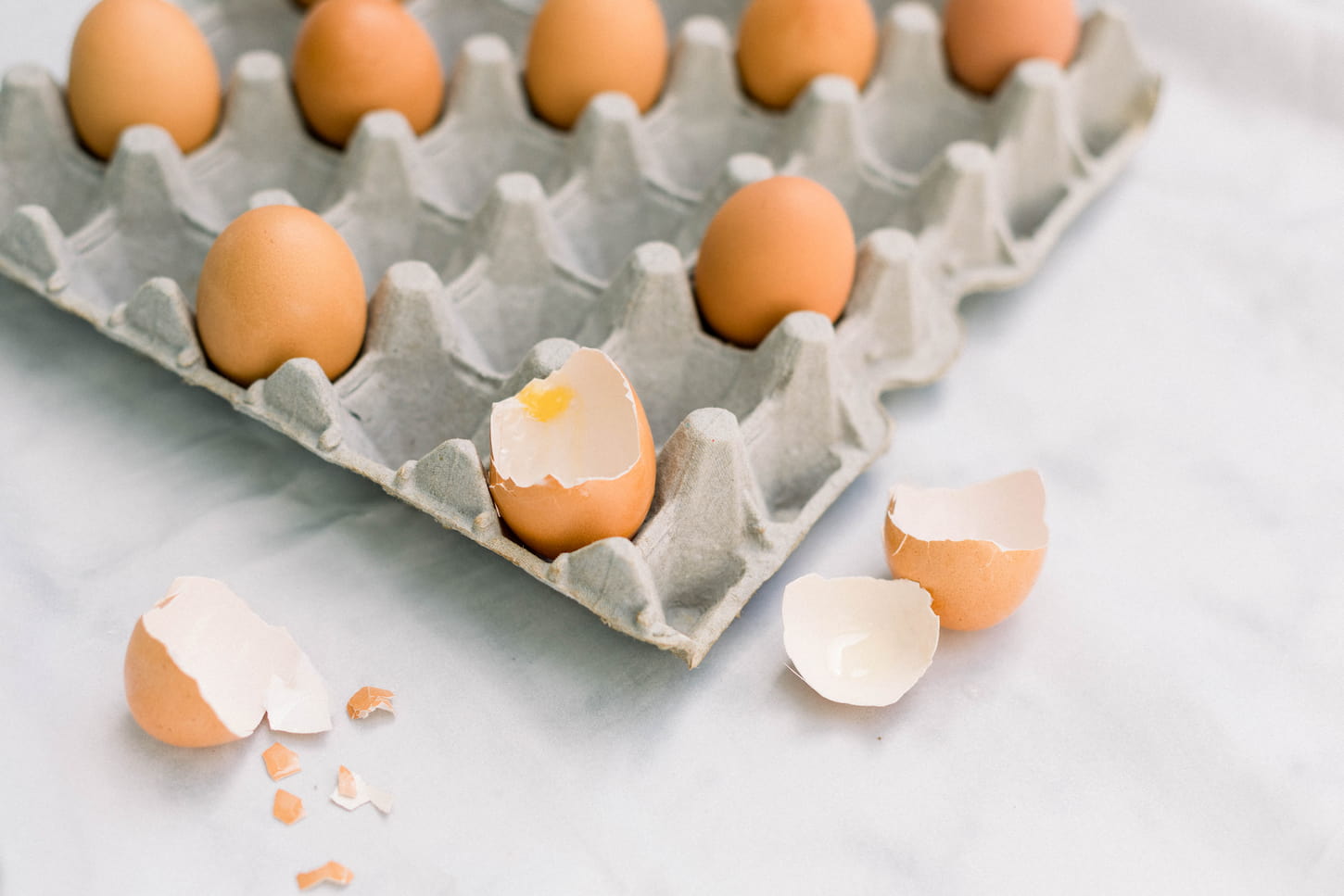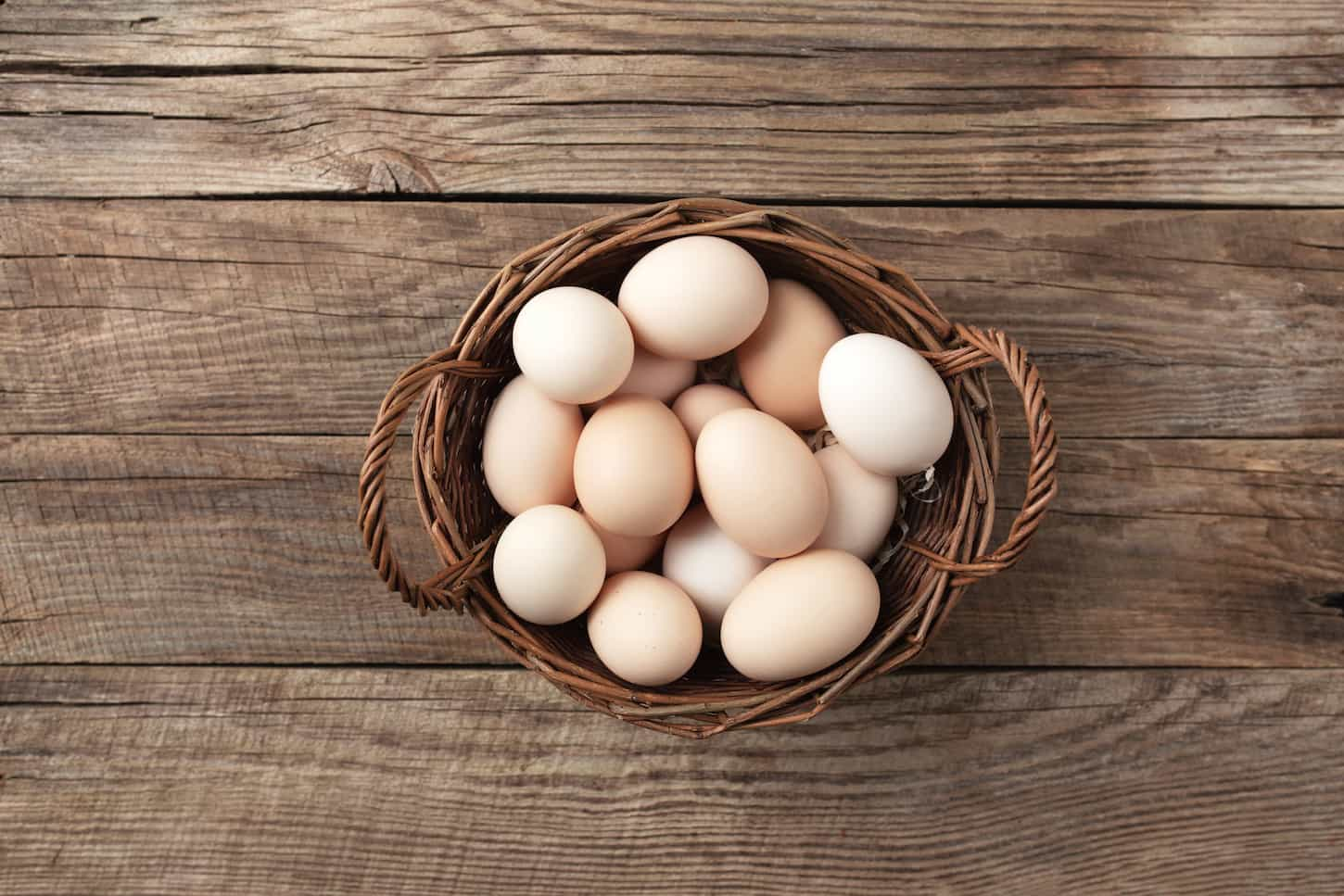Here in the USA we generally keep eggs in the refrigerator, but many chicken owners keep their eggs on the counter. Eggs must be stored correctly because of the risks associated with salmonella. If you’re new to getting fresh eggs, maybe you’re wondering if fresh eggs should be refrigerated.
Fresh eggs have a natural protective seal called the bloom. When the bloom is intact, you don’t need to refrigerate fresh eggs, they’ll stay fresh for up to a month at room temperature. Washing an egg removes the bloom so, you must refrigerate washed fresh eggs.
Eggs keep longer and maintain their fresh taste when they are stored correctly. If you want to learn about how to store your eggs safely, look at this vital information below.

When Do Fresh Eggs Need to be Refrigerated?
It’s important to refrigerate fresh eggs after they have been washed, or if they’ve been sitting on the counter for 2 – 4 weeks. Don’t leave washed or previously refrigerated eggs out at room temperature for more than two hours.
Fresh eggs are covered in a protective seal called the “bloom” which naturally prevents bacteria from entering the egg through its semi-porous shell.
Washing an egg removes the bloom and makes it more vulnerable to bacterial invasions such as salmonella. Thus, if you wash a fresh egg, it must be refrigerated afterward.
A fresh egg with the bloom intact will stay fresh at room temperature for up to 4 weeks. However, if the egg is heavily soiled it’s only safe for around a week.
So, if an egg is really dirty it is better to wash and refrigerate it. Overall, eggs stay fresher in the refrigerator where they can last for up to 6 months in an airtight container.
Once an egg is in the refrigerator don’t leave it sitting out on the counter for more than two hours. As an egg cools, condensation gathers on the shell, and the moisture can encourage bacteria to enter the egg.
When Can Fresh Eggs Stay Out on the Counter?
Fresh eggs can only stay out on the counter if they haven’t been washed. If the eggs are dirty and you want to keep them on the counter, try wiping them down with a dry cloth to remove the dirt. If the muck won’t come off, it’s safer to wash the egg and store it in the refrigerator.
If you have chickens, the best way to keep their eggs clean is by regularly changing the bedding in their nesting boxes. If the bedding is clean, the eggs are less likely to get feathers, straw, or droppings stuck on them.
It’s good to keep eggs on the counter because it’s a good reminder to eat them, and easier to keep an eye on the egg supply. Room temperature eggs are also better for baking and in recipes such as mayonnaise. Not to mention fresh eggs on the counter are the emblem of any thriving homestead.
If eggs are kept on the counter, they must be washed before use. The best way to clean fresh eggs is with warm water, without detergent.

How Long Do Fresh Eggs Last on the Counter or Unrefrigerated?
Unwashed fresh eggs will last for around a month at room temperature. However, the quality will begin to decrease after around 2 weeks. Eggs stored in a cold room will stay fresher for longer than eggs left in a warm room.
Most people like to put uneaten eggs from the counter into the refrigerator after two weeks to preserve the taste and quality.
Make sure you have a way to determine the fresh eggs from the older eggs and eat the older ones first. This can be done with labels, writing on the egg, or by using a special countertop egg dispenser.
How Long Do Fresh Eggs Last in the Fridge?
Fresh eggs can last for up to 3 months in the fridge, which increases to six months if they’re in an airtight container. The refrigerator must be at or below 40 degrees to preserve eggs safely.
It’s better to store eggs in the coldest part of the refrigerator, but not where they’ll freeze. Even though the egg compartment is usually in the door it’s too warm in this section.
The coldest part of a refrigerator is in the back. Store the eggs pointy side down – this keeps the air sac at the top of the egg, which is good for cushioning and helps prevent moisture loss.
Eggshells are porous, so they absorb odors that can affect the taste. This is why we usually store them in cartons. If you want your eggs to taste good, don’t store them next to strong-smelling food in the refrigerator, or raw meat.
How Long Are Eggs Good For?
Fresh eggs can last for between 3 and 6 months in the refrigerator and up to a year in the freezer. Boiled eggs can be preserved if you pickle them, and last for 3 to 4 months in the refrigerator. If you have a freeze-dryer, you can also freeze-dry eggs, which will keep them good for years.
Unless they’re pickled, boiled eggs don’t last as long as fresh ones. If a boiled egg isn’t eaten right away it needs to be refrigerated, where it will last for one week in a sealed container.
Boiled eggs should never be frozen. The best way to preserve them is by pickling or freeze-drying. Take a look at the table below for a quick overview of how long eggs last.
| Storage Method | How Long Eggs Are Good |
|---|---|
| On the Counter – Unwashed | 2 to 4 weeks – But better to put them in the refrigerator after two weeks to keep them fresh and tasty. Never store washed eggs on the counter. |
| Refrigerator – Normal Container | 3 months |
| Refrigerator – Sealed Container | 6 months |
| Frozen | Up to one year – As long as you freeze them correctly. However, frozen eggs will start to lose their quality after around 4 months |
| Pickled | 3 or 4 Months – You must keep pickled eggs in a sealed container in the refrigerator. |
| Freeze Dried | 5 to 25 years – You can freeze dry both raw and cooked eggs but not their shells. |
How to freeze eggs
Eggs will stay good for up to a year in the freezer, and you can freeze the whole egg or the whites and yolks separately, depending on how you want to use them. However, before attempting to freeze eggs, there are a few things that are good to know.
First, only freeze fresh eggs, not ones that have been sitting in the refrigerator for months, and never freeze eggs while they’re in their shell. The shell will crack and expand during freezing.
Also, it’s a different process for freezing yolks and whites, and you can’t freeze eggs with the yolk intact.
Before freezing a whole egg or egg yolks, beat them up first (as if you are going to make scrambled eggs).
If freezing the yolks alone, add either salt or sugar (depending on how you’re going to use them), otherwise, they will congeal. You don’t have to beat the whites before freezing them if they are separated from the yolk.
Ice Cube trays are a great container to freeze eggs in, but make sure you leave room in each cube for the egg to expand.
If freezing eggs in ice cube trays, remove the cubed eggs once they’re frozen and transfer them to a sealed bag or container. Finally, don’t cook frozen eggs – always defrost them first.

How to Tell if Eggs Have Gone Bad
You can tell if an egg has gone bad by carrying out one or two simple tests. The most common test is the float test, where the egg is submerged in water. Other methods include shaking the egg next to your ear, using the candle test, or opening the egg to see what’s inside.
If a bunch of eggs is found outside or in the refrigerator and you have no idea how long they’ve been there, test their freshness before tossing them away. That said, eating bad eggs can make you very ill so, always follow the golden rule – if in doubt, throw it out!
If you want to know how to tell if an egg has gone bad, perform one or two of these simple tests.
Test #1 – The float test
Put the egg in a glass or bucket filled with room temperature water. If the egg sinks to the bottom and lays flat on its side, it’s pretty fresh. If the egg sinks to the bottom but stands up, this is ok, but it could be a few weeks old. If the egg floats, it’s probably gone off so don’t use it.
Test #2 – Shaking
Hold the egg next to your ear and shake it gently. If the egg is fresh, you won’t hear anything moving around. If movement is heard from inside, the egg is bad, or you’re shaking it too hard. Shaking the egg is the most unreliable way to test it
Older eggs make a noise because the small air sac inside gently expands as it gets older, leaving space for the contents to move around. The expanded air sac is the reason why old eggs float and why they’re easier to peel when they’re boiled.
Test #3 – Candle
The candle test is a traditional way to monitor chick development in an egg, and it can also be used to test for freshness. Go into a dark room with the egg and a small powerful flashlight. In the past people used a candle to test the eggs, hence the name.
Hold the egg in your fingers, wide side down, and shine the light into the bottom of the egg. Next, tilt the egg slightly and turn it quickly from left to right. You should be able to see the contents through the shell.
The air pocket of a fresh egg will be around an eighth of an inch wide. The size will increase as the egg gets older. As well as having a large air sac, the contents of an old egg will move around quickly as the egg is twisted.
Test #4 – Smell and visual
When cracking a rotten egg open there’s usually no doubt that it’s bad due to the putrid smell that comes out of it. Sometimes an old egg might not have a distinctive rotten smell. A normal fresh egg should be odorless. If an egg smells unusual don’t eat it.
Visual signs that an egg has gone bad are a discolored yolk or a cloudy white. With older eggs, the white will also be runny, and the yolk will look flat and unpronounced.
Why do Americans Refrigerate Their Fresh Chicken Eggs?
To reduce the risk of salmonella in the USA, all eggs sold in stores are refrigerated. Food laws from the USDA state that suppliers must wash their eggs before they sell them, and the eggs need to be refrigerated after washing.
Salmonella is a bacteria that can cause severe food poisoning, especially in vulnerable people. The bacteria live in a chicken’s digestive tract and penetrate an egg via feces.
If the feces of an infected chicken sits on an egg, potentially the eggs are more vulnerable to salmonella. This is why Americans wash and refrigerate their eggs.
Do People Outside of America Really Not Refrigerate Fresh Eggs?
In most countries including Europe, people don’t automatically store their eggs in the refrigerator. Eggs from the store are sold at room temperature because they have different regulations about salmonella control.
For example, in most places like the United Kingdom (UK), egg suppliers are not required by law to wash their eggs before they sell them, therefore they don’t need to refrigerate them.
To reduce the risk of salmonella, instead of washing and refrigeration, they have strict regulations about vaccinating their birds.

Best Products For Storing Eggs
Ready to collect and store some eggs? Here are some of the best products I’ve found and used to do just that. Keep in mind that I usually recommend buying locally, but some of these products aren’t easily found locally, even at feed stores. So sometimes, just buying online is easier.
- Collecting eggs is ten times easier with an egg basket! We’ve got an 8-inch basket like this, though we opted for the black. Even so, this egg basket option comes in a 2-pack (I wish we had 2!) and has several color options. It’s available on Amazon.
- Storing eggs on the counter is easier with an egg tower. I recommend getting one that gets wider as it goes down. It does take up more countertop space, but it’s a lot sturdier and less likely to tip over. This is the one we have, and it’s on Amazon.
If you’re going to keep eggs in cartons, here are a few non-traditional options for you that can be reused pretty much indefinitely.
- This plastic, locking egg container looks like it’d be easy to keep in the fridge or take camping. Click here to see pricing on Amazon.
- Keep multiple dozens of eggs in the fridge easily, with an egg container like this one from Amazon.
Packaging and selling freshly laid eggs to neighbors? Most city ordinances I’ve seen about it say that eggs must be put in a new egg carton, and should be labeled with the date. Here are some products to help you get that done, although I’ve seen great prices on egg cartons at local feed stores.
- Cute cartons to hold a half-dozen eggs (6 eggs) and they come in bulk on Amazon.
- These egg stickers are a cute way to add a fun way to date eggs. Click here to see the best pricing on Amazon.
Frequently Asked Questions About Refrigerating Eggs
Do you have to refrigerate store-bought eggs?
In order to reduce the risk of Salmonella, the law in the U.S. requires suppliers to wash and refrigerate their eggs before the sale. Washing removes an egg’s natural coating called the bloom. Without it, eggs are vulnerable to bacteria. Therefore, you must keep store-bought eggs refrigerated.
Do you have to refrigerate hard-boiled eggs?
Hard-boiled eggs must be refrigerated within a few hours after cooking. According to the USA Food Safety and Inspection Services (FSIS), a boiled egg will last for a week in the refrigerator if it’s kept in an airtight container.
What are the best ways to store eggs?
It’s fine to store fresh, unwashed eggs on the counter for a few weeks, but for long-term storage, the best way to preserve eggs is in a sealed container in the refrigerator. At cold temperatures, eggs will retain their flavor and quality better over a longer period.
Frozen eggs may last longer than refrigerated ones, but freezing eggs can be tricky, and eggs lose their quality after a few months in the freezer.

Key Takeaways and Next Steps
It’s totally fine to store fresh eggs on the countertop as long as they aren’t washed first. However, uneaten eggs must be transferred from the counter to the refrigerator after two or three weeks.
Overall, eggs will last longer in the refrigerator, up to 6 months. They can also stay on the counter for a few weeks and still taste great.
Always label the eggs or use a reliable system where you use the oldest eggs first. If you don’t know if an egg is still good or not, always err on the side of caution and throw it away – bad eggs can be harmful to your health.
For more information regarding fresh eggs, check out these great articles I wrote to answer some commonly-asked questions:
- Are Deformed Eggs Safe To Eat?
- How Long do Pullets Lay Small Eggs? Pullet Egg Guide
- How Long You Can Safely Store Fresh Eggs (on the counter, in the fridge, etc)
- 9 Best Ways to Store Boiled Eggs in Shell (Long-Term)
Resources
Learning from your own experience is essential, but learning from others is also intelligent. These are the sources used in this article and our research to be more informed as homesteaders.
- FSIS, www.fsis.usda.gov/food-safety/safe-food-handling-and-preparation/eggs/shell-eggs-farm-table#3. Accessed 12 Feb. 2022.
- Berkheiser, Kaitlyn. “How Long Are Hard-Boiled Eggs Good For?” Healthline, 20 Sept. 2019, www.healthline.com/nutrition/how-long-are-hard-boiled-eggs-good-for#shelf-life.
- “Can You Freeze Eggs? | Freezing Eggs | Official Egg Info.” Egg Info, www.egginfo.co.uk/egg-safety/storage-and-handling/can-you-freeze-eggs. Accessed 12 Feb. 2022.
- Glover, Anna. “Pickled Eggs Recipe | BBC Good Food.” BBC Food, 8 Aug. 2020, www.bbcgoodfood.com/recipes/pickled-eggs.
- “National Center for Home Food Preservation | How Do I? Pickle.” National Center for Home Food Preservation, nchfp.uga.edu/how/can_06/pickled_eggs.html. Accessed 12 Feb. 2022.
- “Salmonella and Eggs.” Centers for Disease Control and Prevention, 16 Feb. 2021, www.cdc.gov/foodsafety/communication/salmonella-and-eggs.html.
- “Salmonella Infection – Symptoms and Causes.” Mayo Clinic, 11 Oct. 2019, www.mayoclinic.org/diseases-conditions/salmonella/symptoms-causes/syc-20355329.
- “Science of Eggs: Anatomy of an Egg | Exploratorium.” Exploratorium: The Museum of Science, Art and Human Perception, www.exploratorium.edu/cooking/eggs/eggcomposition.html. Accessed 13 Feb. 2022.
